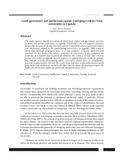| dc.description.abstract | The study explores faculty perception of intellectual capital and governance practice
in public and private universities in Uganda. Furthermore, the investigation examines
factors that account for faculty retention and the relationship between good governance
and intellectual capital in the participating universities in Uganda. Data analysis
shows that although good governance is a vital predictor of faculty attraction and
retention, the key factors that attract academics to universities is pay, prospects for
academic development and location. In addition, the analysis reveals that whereas
private universities in Uganda need to improve on opportunities for academic growth,
pay, and job security, participating public universities should focus on transparency,
pay, and communication. Overall, the results show a positive relationship between good
governance and intellectual capital to the effect that the higher the good governance the
higher the intellectual capital attracted and retained by universities. | en_US |

